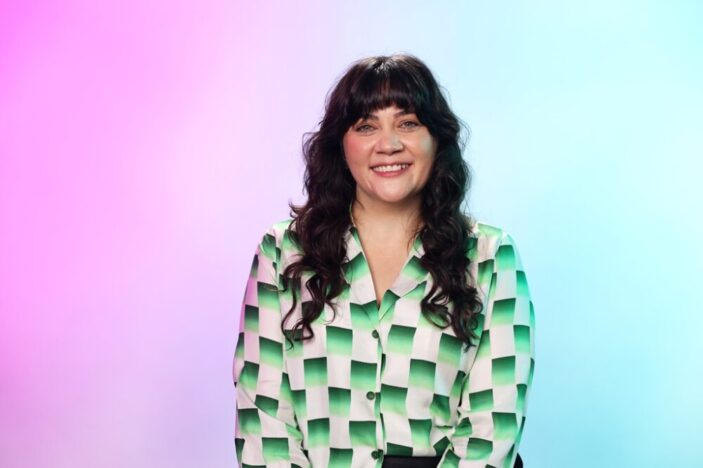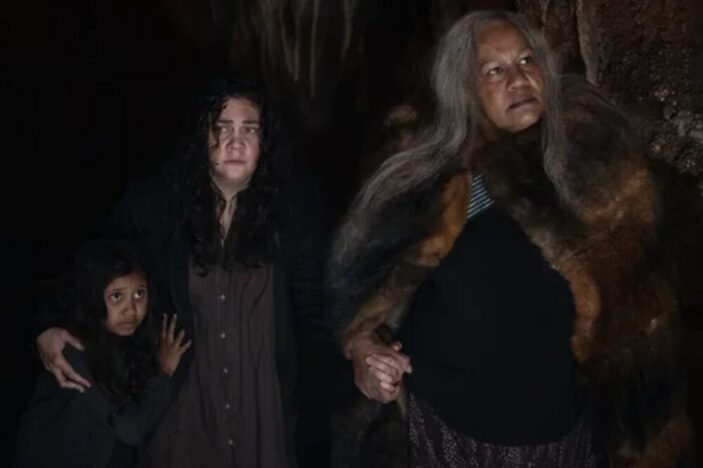
A young Aboriginal couple brings home their second baby. What should be a joyous time takes a sinister turn, as the baby’s mother starts seeing a malevolent spirit she is convinced is trying to take her baby.
Such is the logline for Jon Bell’s The Moogai, a new horror film from the producers of The Babadook and Talk To me, seeped in Indigenous lore and is finally set to terrify audiences this spooky season following a successful festival run across 2024.
Basking in the afterglow of the success of The Office, which is now the most successful Australian Prime Video Original locally with the biggest opening weekend viewership for any Australian title, star Shari Sebbens spoke with our own Peter Gray about the challenges and rewards of telling this story, how it communicates the Indigenous experience, and what it taught her as a storyteller herself.
Before I get to The Moogai, and this movie is obviously so much more than a horror movie, but it falls within the genre, and I’m always curious to know what movie acted as a gateway for you to the genre?
I mean, I have a favourite horror movie. I don’t think of it as a gateway, but I love it. I think The Conjuring is one of my favourite films of all time. I just think it’s so beautiful and terrifying. It’s just some of the most simple examples of horror. The clap thing? Oh, and when she’s on the dresser? And the other would be Signs. There’s just something about it. I think anytime you put kids in danger…
Well, speaking of kids being in danger, we have The Moogai. With the character of Sarah, what did you find the most challenging, or even rewarding, in portraying someone who’s confronting both supernatural and personal fears throughout?
I think it’s something that I’ve only just recently started thinking about with the film coming out. I’ve only really started to just talk about it, but what was one of the biggest challenges is playing someone who doesn’t have instinctive empathy towards her Aboriginal birth mother, her Aboriginal culture, and who also doesn’t have an instinctive curiosity about it. It was really hard for me to understand how somebody can know about their birth mother, their Aboriginal mother, but not a single part of them is interested in getting to know who they are, or what her story is. I think the flips side of that is though, that Sarah desperately and deeply wants to connect, which is why she falls in love with and marries and has children with an Aboriginal man.
Yeah, I think that was the biggest challenge. Being on set with Tess Rose, who I just think is a scene stealer in the film, as well as Jahdeana (Mary), who is Jon’s (Bell, director) granddaughter, who plays my daughter. The days on set with Tessa, she just brought such an ease and a huge depth of experience and knowledge. It trembles under the surface with her, and she doesn’t have to reach down for it. She plays someone so insane, yet so majestic and matriarchal. She brings such gravitas to every scene. And then with Sarah, it just made me think, “How does she not care to know more about her mother?”
(Sarah) just has these barriers that don’t allow her to want to connect with her, and that’s to do with the fact that she was told that her mother didn’t want her, which is a horrible, horrible, lingering remnant of the Stolen Generations policies. I think one of the great things the film brings into question is if you think it was so long ago and you think it’s over, then you have to think again. We’ve become too blasé, or too willing to forget the past.
Horror is always a genre that incorporates deeper themes or addresses larger societal issues. What do you feel this film communicates about the Indigenous experience in Australia today?
I know for Jon, certainly, that the immediate goal was to have the film as a love letter to all the mob. He extended that to the parallels between, whether it’s Native American Indigenous people or Māori mob, as a love letter to say, “You belong.” No matter what government policies removed them. They are one of us and they belong here. I think that’s such a beautiful place to come from, in terms of a message that you want your horror film to have. I think, for me, one of the things it does is show how you can assume that if you’re ticking all the boxes, and you think you’re doing all the things in life that you lead you to access a successful life, you should deserve nice things. A nice house, a nice family…stuff like that. But I would say it’s a warning. If you deny Aboriginality, you’re going to be fucking miserable. That’s my own personal political vendetta in the film. I guess it’s like, pay some respect to where you come from, because it will come back to haunt you in ways that you can’t even imagine. I think that’s evident in the film.

And looking at direction, did working on the film influence you in your own creative process?
Oh, my gosh. Do you know what was so awesome? Was actually just giving that all away to the storytelling and allowing myself to just be so completely present with Jon as an actor. I’ve had a really fortunate career, but Jon is someone that, you know, I went on this incredible experience with him. It was built entirely on trust, and he allowed me as an actor to go places, but to also have these incredible conversations that influenced me (as a director). I want my actors from hereon to feel like they can trust me, because all I want is for them to spread their wings and fly. Jon really showed me another side of directing.
No matter how ambitious your screen vision is, ultimately you have to be able to talk to your actors, and you have to make them trust you. And (Jon) went above and beyond in recognizing the weight of what this story meant for me as an Aboriginal woman. There were just some really specific moments that I actually feel a bit protective of talking about, but they were so special to me as an Aboriginal woman and a director storyteller.
It’s always nice to hear that as terrifying as something comes across on screen, the experience itself is quite light. Not saying the themes in the film are, but it certainly seems like the experience was one for you.
There were days on set where our first AD would threaten to separate Meyne (Wyatt, actor) and I, or Clarence (Ryan, actor) and I because we couldn’t stop laughing. There has to be a part of the process when you’re making something as traumatic as a horror film to have an outlet to relieve the pressure. Mainly so you don’t go home like a fucking mad person (laughs).
The Moogai is now screening in Australian theatres.
